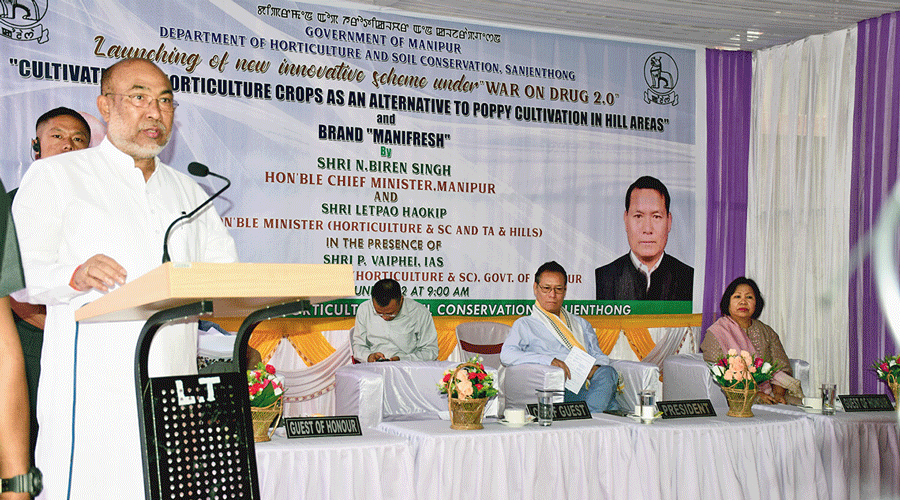Manipur on Friday scaled up its war against drugs by launching an economically beneficial scheme to help poppy farmers switch to alternative high-value crops.
Illegal cultivation of poppy — the source of opium, heroin and brown sugar — is rampant in the 11 hill districts of the state owing to limited livelihood opportunities and easy money. The BJP-led coalition government in the state has been trying to eradicate it since its first term.
Launching the scheme Cultivation of Horticulture Crops as an Alternative to Poppy Cultivation in Hill Areas under its “War on Drug 2.0” campaign at a function organised by the department of horticulture and soil conservation in Imphal, chief minister N. Biren Singh said his government was “committed” to its “war on drugs” and would not back off in its effort to root out the menace from the state.
War on Drug 2.0 has gathered more steam in Singh’s second term, which started from March 21.
Till May, over 140 drug traffickers have been arrested, contraband worth over Rs 180 crore seized and over 380 acres of poppy field destroyed. In the last few years, poppy plantations across 6,600 acres have been destroyed, Singh said on Friday.
Last month, Singh had said 70 per cent of the hill population had supported his government’s fight against drugs, poppy cultivation and drug trafficking to ensure a better future for the younger generations.
The government has adopted a multi-pronged approach through inter-departmental efforts to provide an alternative livelihood to poppy cultivators with a sustainable integrated farming system.
A budget of Rs 4 crore has been earmarked for 2022-23 to provide an alternative livelihood to poppy cultivators in five of the 11 hill districts of the state in the first phase.
Singh said the scheme aimed to provide financial assistance, farm inputs and marketing assistance to the farmers for producing alternative crops and referred to how 355 farmers from Kangpokpi, Kamjong and Ukhrul districts benefited from the alternative arrangements.
A senior official told The Telegraph that there were around 6,500 acres under poppy cultivation and there were approximately 6,500 farmers. One hectare of poppy can be cultivated within four months and the yield can fetch up anything between Rs 12 lakh and Rs 14 lakh per hectare.
The state government is using the Narcotics and Affairs of Border (NAB), a wing of the state police, the deputy commissioners and the district horticulture officers to identify the poppy growers, an official said. The area under poppy cultivation is being determined through satellite mapping.
In the first phase, the scheme will target 500 poppy farmers and an area of 200 hectares before the poppy season starts from August.
Poppy farmers are mostly small and marginal farmers. “The farmers, who have limited resources are vulnerable to various forms of illegal activities. Illegal poppy cultivation became a haven for these helpless poor farmers,” the official said.
The beneficiary farmers will have to sign a note that they will not indulge in poppy cultivation and we are promising assured market for their produce.
“We will also provide them with incentives if they can manage their plantation for two-three years. We will hand the incentives through the direct bank transfer mode,” the official said.
The chief minister later flagged off vehicles carrying planting materials for farmers of five hill districts — Chandel, Kamjong, Kangpokpi Tengnoupal and Ukhrul. He also launched the brand “MANIFRESH” under which, organic produce from the hills will be “marketed”.
Horticulture and soil conservation minister Letpao Haokip said the government had started providing saplings of high value and nutritional crop varieties, which is in demand outside the state too, as an alternative to poppy plantation.
Project director of Manipur Organic Mission Agency (MOMA) K. Debadutta Sharma said the scheme would encourage poppy farmers to cultivate high value crops and fruit trees such as pineapple, kachai lemon, low-chilling apple, large cardamom, turmeric, ginger and other quality hybrid vegetable seeds. Crops will be both long and short term so farmers can have a decent income.
The chief minister had entrusted the horticulture department to come up with an alternative livelihood for farmers whose poppy crops had been destroyed by the law enforcing agencies.
“Horticulture sector is the most promising sector in Manipur as 90 per cent of the areas are hilly,” Sharma said.











